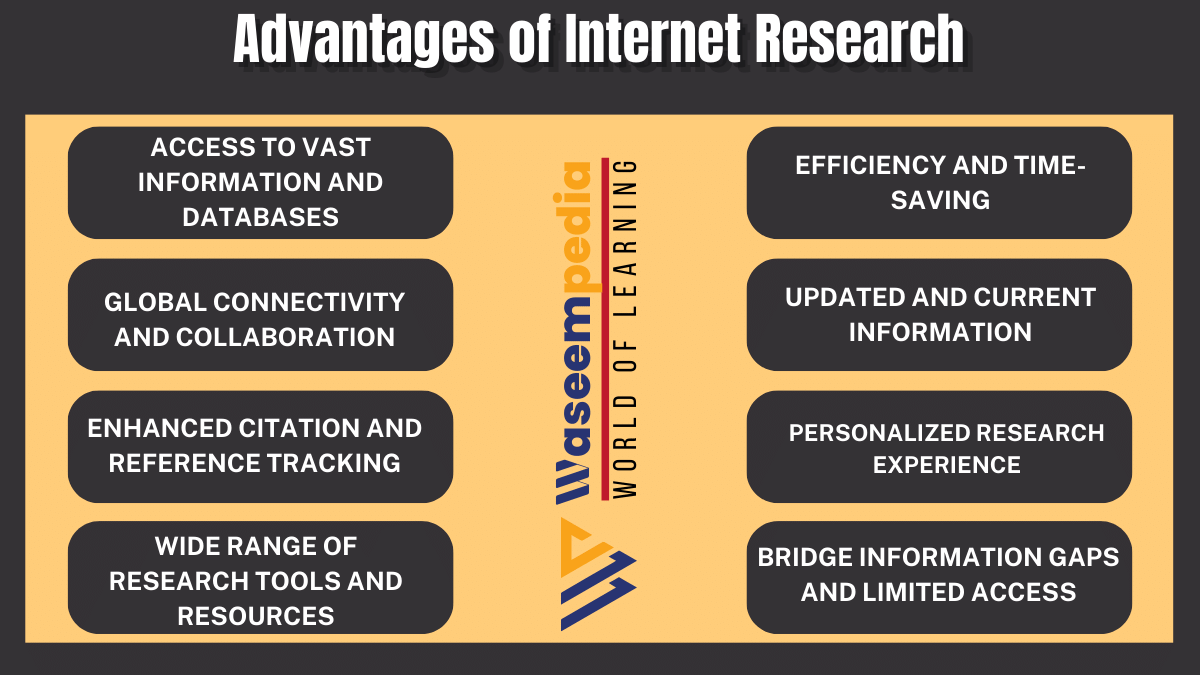In the digital age, the Internet has become an invaluable tool for conducting research. Whether you’re a student, a professional, or a curious individual seeking knowledge, Internet research offers a multitude of advantages.
It enables us to access vast amounts of information, connect with experts, and explore diverse perspectives. In this article, we will explore the advantages of Internet research and how it has transformed the way we gather and analyze information.

Internet research has revolutionized the way we seek and acquire information. Gone are the days of relying solely on traditional libraries and physical resources. With the advent of the Internet, a vast array of information is just a few clicks away.
Whether you’re conducting academic research, market analysis, or simply satisfying your curiosity, Internet research provides unparalleled advantages.
Internet research has revolutionized the way we gather, analyze, and utilize information. With its vast range of resources, speed, global reach, and opportunities for collaboration, Internet research has become an indispensable tool in various domains.
As we harness the advantages of Internet research, it is essential to critically evaluate and verify the credibility of information sources. By leveraging the power of the Internet, we can unlock the doors to knowledge and navigate the ever-expanding realm of information.
10 Advantages of Internet Research
10 Advantages of Internet Research are as following
1. Access to a Wide Range of Information
The Internet provides access to an extensive range of information on almost any topic imaginable. Through search engines, databases, and online resources, we can explore academic journals, news articles, books, and various other types of content. This wealth of information enables comprehensive and in-depth research across multiple disciplines.
2. Speed and Efficiency
Internet research offers unparalleled speed and efficiency. With a few keystrokes, we can search for specific keywords, phrases, or topics and instantly retrieve relevant information. Unlike traditional research methods, where manual searching and browsing through physical materials may take hours or even days, Internet research allows us to obtain results in a matter of seconds.
3. Diverse Perspectives and Global Reach
One of the most significant advantages of Internet research is the ability to access diverse perspectives and a global knowledge pool. The Internet transcends geographical boundaries, allowing us to explore ideas, insights, and research from scholars, professionals, and individuals worldwide. This global reach enriches our understanding and broadens our perspectives.
4. Connection with Experts and Peers
Internet research facilitates connections with experts and peers in various fields. Through online forums, academic networks, and social media platforms, we can engage in discussions, seek advice, and collaborate with individuals who possess specialized knowledge. This networking aspect of Internet research fosters learning, exchange of ideas, and potential collaborations.
5. Interactive and Multimedia Resources
The Internet offers interactive and multimedia resources that enhance the research experience. From videos and audio recordings to infographics and interactive tutorials, these resources engage multiple senses and facilitate better comprehension and retention of information. Interactive simulations and visualizations also enable us to grasp complex concepts more effectively.
6. Updated and Current Information
Internet research provides access to up-to-date and current information. News websites, research databases, and online publications continuously update their content, ensuring that we stay abreast of the latest developments in our fields of interest. This real-time information enables us to make informed decisions, write accurate reports, and stay relevant in our respective industries.
7. Customization and Personalization
Internet research allows for customization and personalization of the research process. We can refine search queries, use advanced search filters, and tailor our research to specific criteria or requirements. This customization enables us to find relevant and targeted information, saving time and improving the accuracy of our research outcomes.
8. Collaboration and Crowdsourcing
Internet research facilitates collaboration and crowdsourcing. Online platforms and tools enable researchers to share their findings, seek feedback, and collaborate on projects with individuals from different locations. Crowdsourcing platforms allow researchers to tap into the collective knowledge and expertise of a diverse community, enhancing the quality and breadth of research.
9. Efficient Organization and Storage
Internet research offers efficient organization and storage of research materials. Digital tools such as bookmarking, note-taking apps, citation managers, and cloud storage solutions enable us to organize and store our findings in a systematic and easily accessible manner. This organization ensures that we can retrieve and refer to our research materials efficiently.
10. Accessibility and Inclusivity
Internet research promotes accessibility and inclusivity. Digital resources can be accessed from anywhere, eliminating geographical barriers and enabling individuals with physical limitations or limited access to traditional research facilities to participate in the research process. Online resources also cater to diverse learning styles, making research more inclusive and accommodating.
Related FAQ’s
What are some popular online research databases?
Some popular online research databases include PubMed, JSTOR, IEEE Xplore, ScienceDirect, and Google Scholar. These platforms provide access to a vast collection of scholarly articles, research papers, and academic journals across various disciplines.
How has Internet research impacted the field of academia?
Internet research has transformed academia by enabling easy access to a wide range of scholarly resources, facilitating global collaborations among researchers, and accelerating the dissemination of knowledge. It has made academic research more efficient, interdisciplinary, and accessible to a broader audience.
Can you explain the concept of crowd sourcing in Internet research?
Crowd sourcing in Internet research refers to the practice of obtaining ideas, contributions, or feedback from a large group of people, often through online platforms or communities. Researchers can tap into the collective intelligence of the crowd to gather insights, collaborate on projects, and solve complex problems.
What are the 5 advantages of research?
Knowledge Expansion: Research enhances understanding and generates new knowledge.
Innovation: Research drives technological and societal advancements.
Problem Solving: Research identifies solutions to challenges in various fields.
Informed Decisions: Research provides data for making well-informed decisions.
Academic and Professional Growth: Research contributes to personal and professional development.
What are the 5 types of research?
The five advantages of research are as following.
Knowledge Expansion: Research enhances understanding and generates new knowledge.
Innovation: Research drives technological and societal advancements.
Problem Solving: Research identifies solutions to challenges in various fields.
Informed Decisions: Research provides data for making well-informed decisions.
Academic and Professional Growth: Research contributes to personal and professional development.

